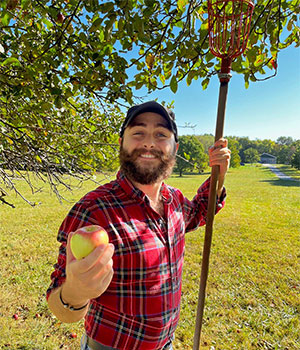Master of Arts in Teaching: Agricultural Education
Master of Arts in Teaching: Agricultural Education
This flexible, online master’s program is designed for current teachers or career changers and will prepare you for agricultural education teacher certification at the secondary level (grades 6-12).
The online Master of Arts in Teaching (MAT) is a flexible, practical and convenient pathway to teaching. With this program, you will benefit from:
- Flexible Pace/Schedule. Design a course schedule that fits your life. Complete the program in as little as 12 months or go at your own pace. Begin in fall, spring or summer semesters.
- Financial Aid/Scholarships. More than 70% of MAT students receive scholarships such as K-State Online Scholarships and/or the Kansas Board of Regents Kansas Teacher Service Scholarship. All students receive the same tuition rate wherever they live.
- Quality/Job Placement. Join a program that is rated #20 in the United States by US News & World Report and that places 97% of its students within one year of graduation.
- Personalized Mentorship. Explore teaching with our team of MAT GradCats — experienced, veteran mentor teachers.
- Exceptional Learning Community. Your peers in the MAT program come from across the country and around the globe, bringing talent, insight, and shared purpose into every conversation.
- License Transfer. Transfer your Kansas Teaching License to other states upon completion of additional license transfer requirements, if any.
Agricultural education offers specialized courses that will explore content knowledge, providing enrichment and remediation to prepare you for your internship experience. You will focus on classroom, laboratory and student organization management preparing you for all roles in agricultural education.
The secondary agricultural education MAT consists of two, flexible tracks.
- License-seeking track: For students who pursue the MAT while continuing their current employment.
- Practitioner track: For students who pursue the MAT while teaching full time. Kansas teachers are required to hold a Restricted License.
Once you complete the program, you’ll be eligible to apply for an Initial Teaching License in the state of Kansas. Kansas Licensure also requires Praxis content test. The license will transfer to other states upon completion of any additional requirements for that state.
STUDENT SPOTLIGHT
Aram Kokuzian,
middle school gifted facilitator
"I always knew I would like to teach at some point in my life but was never clear on when to start. The real decision to act came during the Covid pandemic. I reorganized my priorities for what I wanted out of life and decided to go for it right away. The pandemic shook up my whole outlook on planning for the future and encouraged me to act in the moment rather than wait for stars to align in the future."

July 30 — Don't miss our interactive webinar
Do you have questions about the MAT pathways? Join us live at 7 p.m. (CDT) on July 30, 2025, with Dr. Thomas Vontz and TJ Duntz.
*Tuition rate is based on 2024-2025 rates, which are subject to change annually. Your hours and costs will differ depending on your transfer hours, course choices and academic progress. For a full breakdown of all tuition and fees, please visit K-State's Online Tuition and Fees website.
Dr. Jonathan Ulmer specializes in agricultural education. He teaches a variety of classes, preparing students for careers as high school agriculture teachers. Prior to coming to K-State, Dr. Ulmer served on the faculty at Texas Tech University and the University of Missouri. Growing up in Nebraska, he earned his bachelor’s degree in agricultural education at the University of Nebraska and taught agriscience at Medicine Valley High School in Curtis, Nebraska. He earned his master’s in agricultural education at Oklahoma State University and his doctorate in agricultural education at the University of Missouri-Columbia.
